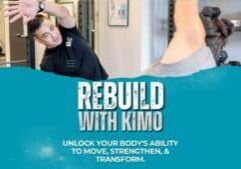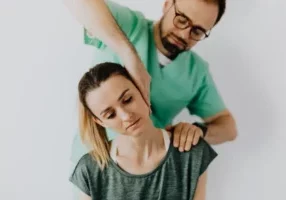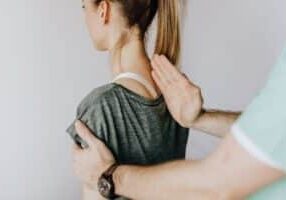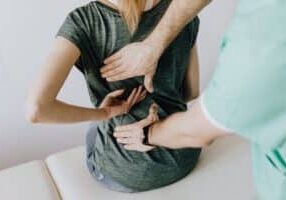
The Rebuild Program FAQ: What You Need to Know – Movement is Medicine
The serene backdrop of our backyards often conjures images of relaxation, family barbecues, and a touch of weekend gardening. Rarely do we associate this calming space with potential health hazards, especially to our lower backs. Yet, a recent episode on our very own “Movement is Medicine Show” featuring Dr. Ashley aimed to shed light on this very topic.
So, let’s dive deeper into these potential dangers and, more importantly, the preventive measures Dr. Ashley enlightened us with.
1. Rolling Away the Pain
Many of us have had that niggling backache after a weekend of gardening or cleaning. The culprit? Stiffness and strain. Dr. Ashley introduced listeners to the concept of using tools we often associate with athletes – the lacrosse ball and foam roller. By applying pressure on specific areas, we can alleviate pain, improve mobility, and even prevent future injuries.
These tools work wonders in releasing tight muscles and fascia, allowing a better range of motion and reducing the strain on your lower back. Spending just 5-10 minutes a day can be the difference between waking up refreshed or with an achy back.
2. Break It to Make It
Human beings weren’t designed for hours of uninterrupted repetitive movements. Whether it’s raking leaves, power washing the driveway, or planting flowers, these monotonous activities can cause significant stress to our lower back.
Dr. Ashley’s solution? Taking frequent micro-breaks and incorporating simple stretches. These can range from knee and quad stretches to more dynamic movements. The idea is to vary your activity and give your muscles a brief respite, reducing the risk of overuse injuries.
3. The Power of Cross-Functional Training
Our bodies thrive on varied movements. Dr. Ashley passionately spoke about the significance of cross-functional training, which involves engaging in different types of exercises and movements. This can be as simple as integrating walking, stretching, and weight lifting into your weekly routine.
Such diversity in training ensures that your muscles and joints are prepared for a range of motions, making them more resilient to unexpected strains, especially in the lower back.
4. Watch Out for the Unexpected Culprits
An enlightening segment of the podcast was when Dr. Ashley highlighted activities we often don’t associate with back strain. Even the fittest amongst us can be caught off guard by the toll some backyard tasks take on our bodies.
This isn’t to scare you away from these activities, but rather to make you aware. By understanding the potential risks, you can approach tasks with more caution, ensuring you maintain proper posture and technique, and thereby reducing the likelihood of injuries.
5. Ergonomics: The Backbone of Back Care
While many may associate ergonomics with office setups, the principles are equally vital for backyard tasks. Bending over to pick up leaves or using tools that aren’t suited for your height can gradually strain your lower back.
Dr. Ashley emphasized the importance of mindful movements and investing in ergonomically designed tools, which cater to your body’s mechanics. She also highlighted the need for regular breaks and the importance of paying attention to posture, even in seemingly harmless activities.
Conclusion: Moving Forward Mindfully
As Dr. Ashley poignantly put it, our movement, or lack thereof, directly impacts our health. The lower back, pivotal for so many of our daily actions, deserves attention and care.
The key takeaway from the podcast was simple yet profound: Movement is, indeed, medicine. By incorporating these preventive measures, not only do we protect our lower backs, but we also enhance our overall well-being.
Whether you’re an avid gardener, a weekend DIY enthusiast, or someone just looking to lounge in the backyard, understanding potential risks and how to mitigate them can ensure your outdoor space remains a place of relaxation, not rehabilitation.
Until next time, move with purpose, care for your back, and embrace the medicine of movement!
Happy gardening and safe movements!
Injury-Proof Your Body: How the REBUILD Program Can Help You Prevent Future Pain and Injury
We all know the frustration of an injury that sidelines us from the activities we love. Whether it’s a nagging backache that keeps you from your favorite sport or a sudden sprain that throws off your daily routine, pain and limitations can significantly impact our quality of life. But what if there was a way…
Read MoreBalancing Act: The Impact of Sports Injury Clinics on Work-Life Balance.
Explore how a sports injury clinic can improve your work-life balance in our blog ‘Balancing Act: The Impact of Sports Injury Clinics on Work-Life Balance’.
Read MoreAre Corrective Exercises Effective in Injury Recovery?
Explore the effectiveness of corrective exercises in injury recovery in our blog ‘Are Corrective Exercises Effective in Injury Recovery?’
Read MoreAdvanced Chiro Rehab Techniques: A Revolution in Pain Management
Discover groundbreaking chiro rehab techniques transforming pain management in our blog ‘Advanced Chiro Rehab Techniques: A Revolution in Pain Management’.
Read MoreUnderstanding the Importance of Spinal Rehab for Back Pain
Discover the crucial role of spinal rehab in managing back pain in our insightful blog ‘Understanding the Importance of Spinal Rehab for Back Pain’.
Read MoreExercises You Can Do at Home after a Visit to the Chiropractic Clinic
Stay active at home with exercises from ‘Exercises You Can Do at Home after a Visit to the Chiropractic Clinic’.
Read More





